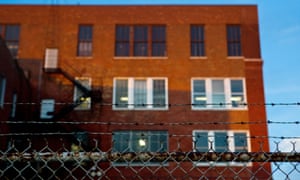 Israel on Tuesday outlawed an Islamist group accused of inciting violence among Arab citizens amid a two-month wave of unrest, and in a separate development approved the construction of hundreds of homes in a Jewish settlement in east Jerusalem.
Israel on Tuesday outlawed an Islamist group accused of inciting violence among Arab citizens amid a two-month wave of unrest, and in a separate development approved the construction of hundreds of homes in a Jewish settlement in east Jerusalem.
The decision to ban the group threatened to worsen already strained relations with the country's Arab minority and was condemned by Arab leaders. The granting of final approval for the construction of more than 400 homes in east Jerusalem was likely to anger the Palestinians.
Israel outlaws Islamic group accused of inciting violence
US urged to free immigrant hunger strikers
 A rights group has urged US immigration authorities to end "retaliatory" measures against detainees as an estimated 500 female undocumented immigrants hold a hunger strike in a Texas for-profit detention centre, in protest against the facility's harsh conditions.
A rights group has urged US immigration authorities to end "retaliatory" measures against detainees as an estimated 500 female undocumented immigrants hold a hunger strike in a Texas for-profit detention centre, in protest against the facility's harsh conditions.
Texas United For Families (TUFF), an umbrella organisation of rights groups, called on US Immigration and Customs Enforcement (ICE) to halt "retaliation against women on hunger strike and that all women on hunger strike are immediately released".
FBI Agents Accused Of Torturing U.S. Citizen Abroad Can't Be Sued
 Federal agents who illegally detain, interrogate and torture American citizens abroad can't be held accountable for violating the Constitution.
Federal agents who illegally detain, interrogate and torture American citizens abroad can't be held accountable for violating the Constitution.
A divided federal appeals court on Friday tossed the lawsuit of a U.S. citizen who claimed the FBI trampled his rights for four months across three African countries while he was traveling overseas.
In so many words, the U.S. Court of Appeals for the District of Columbia Circuit ruled that the man, Amir Meshal, couldn't sue the federal government for such violations, and punted the issue to someone else.
Homan Square revealed: how Chicago police 'disappeared' 7,000 people
 Police “disappeared” more than 7,000 people at an off-the-books interrogation warehouse in Chicago, nearly twice as many detentions as previously disclosed, the Guardian can now reveal.
Police “disappeared” more than 7,000 people at an off-the-books interrogation warehouse in Chicago, nearly twice as many detentions as previously disclosed, the Guardian can now reveal.
From August 2004 to June 2015, nearly 6,000 of those held at the facility were black, which represents more than twice the proportion of the city’s population. But only 68 of those held were allowed access to attorneys or a public notice of their whereabouts, internal police records show.
German human rights group files suit against CIA 'Queen of Torture'
A German human rights group has filed a criminal complaint against Alfreda Frances Bikowsky, a CIA official who allegedly authorized torture of suspected al Qaeda militants. The complaint, submitted in federal court on Mondaynon, presents proof of Bikowsky’s involvement in the torture of German citizen Khaled El Masri and asks that she be prosecuted in Germany.
It also puts Bikowsky, nicknamed the “Queen of Torture,” in the spotlight of European efforts to hold CIA officials accountable for allegations of abuse.
ACLU sues psychologists over CIA interrogation tactics
 The American Civil Liberties Union filed a lawsuit Tuesday against two CIA contractors who designed and implemented the agency's harsh interrogation program, which has widely been denounced as torture.
The American Civil Liberties Union filed a lawsuit Tuesday against two CIA contractors who designed and implemented the agency's harsh interrogation program, which has widely been denounced as torture.
According to the ACLU, James Mitchell and John “Bruce” Jessen — psychologists who had previously worked for the military — designed and participated in the CIA's interrogation methods, which the U.S. government has since renounced. The agency paid their company, Mitchell Jessen & Associates, $81 million, according to an unvarnished Senate report on the interrogation program, a summary of which was released last December.
Where thousands of women vanish every year without a trace
 Thousands of women and girls disappear in Mexico every year - many are never seen alive again. When one couple realised their daughter was missing, they knew they didn't have long to find her.
Thousands of women and girls disappear in Mexico every year - many are never seen alive again. When one couple realised their daughter was missing, they knew they didn't have long to find her.
Elizabeth realised something was terribly wrong within 15 minutes of her teenage daughter, Karen, disappearing.
"I just knew it, I had an anguish that I'd never felt before. I searched the streets, called friends and family, but no-one had seen her," she says.
More Articles...
Page 27 of 198

 Human Rights Glance
Human Rights Glance






























